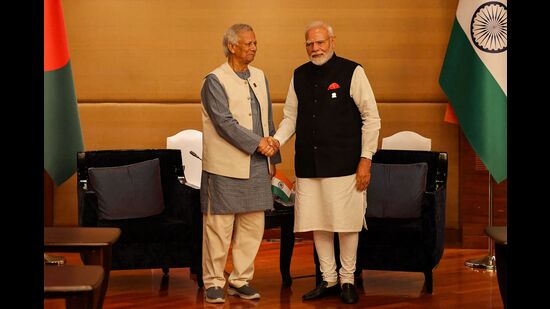Resetting Delhi, Dhaka ties
PM Modi's meeting with Bangladesh's Yunus hasn't improved ties, as trade measures reveal ongoing tensions.
A meeting between Prime Minister Narendra Modi and head of Bangladesh’s interim government Muhammad Yunus earlier this month has not helped end the downward spiral in ties between New Delhi and Dhaka, as is evident from trade-related measures announced by the two sides and a terse diplomatic exchange over the recent sectarian violence in West Bengal. The Indian side has made two overtures to the caretaker administration in Bangladesh so far this year, first by sending foreign secretary Vikram Misri to Dhaka for discussions, and then by agreeing to Bangladesh’s request for a meeting between the top leaders on the margins of the Bimstec Summit in Bangkok. These were two occasions when the two sides could have charted a way forward while setting aside the acrimony that has characterised ties since the ouster of the Sheikh Hasina government in August last year.

Even though both countries have vouched for closer ties, the recent trade-related decisions reflect the reality of a relationship in deep crisis. Even before India ended a nearly five-year-old arrangement for trans-shipment of export cargo from Bangladesh to other countries through Indian airports and ports, Dhaka halted yarn imports from India via land ports, announced plans to shutter three land ports and suspend operations at a fourth, and adopted measures at a key check post on the border with West Bengal that appeared to be aimed at delaying the processing of goods exported from India. All of this needs to be viewed against the backdrop of the caretaker administration’s overtures, first to Beijing, and now to Islamabad, for greater trade ties, and Yunus’s remarks while he was in China that appeared to be an effort to leverage the geographical isolation of India’s seven northeastern states while seeking Chinese investments for Bangladesh. Dhaka has since clarified that Yunus’s comments on the northeastern states’ access to the Bay of Bengal being only through Bangladesh were misinterpreted, but people in the North East have long memories of China’s negative role in the region.
Dhaka’s open welcome to Beijing, while ignoring Indian sensitivities, has not been lost on New Delhi, especially in light of China’s long-standing business and defence interests in Bangladesh. Bangladesh’s relations with Pakistan have a different dimension because of legacy issues and the rainbow nature of the current dispensation in Dhaka. While the Bangladeshi and Pakistani militaries have moved quickly in recent months to improve their ties, the demand for a public apology and return of 1971 assets during the first Bangladesh-Pakistan foreign office consultations in 15 years — held to prepare the grounds for the Pakistan foreign minister’s visit to Dhaka later this month — suggests a difficult road ahead for both countries.
The fact is Dhaka will be foolish to think that it can spite New Delhi by trying to leverage ties with Beijing and Islamabad. Geography and history make it clear that India and Bangladesh should work together for mutual gains. Bangladesh’s remarkable economic growth — even after discounting for inflated numbers — and social advancements in the past two decades were possible because of the close ties it built with India. Improved connectivity, liberal trade facilities and greater trust between the two sides were enabling factors. For India, the crackdown on anti-India militant groups helped in stabilising the northeastern states, while the energy and trade connectivity benefited both Bangladesh and the seven landlocked Indian states. Both capitals must make sure that this trajectory is not compromised for short-term political gains.
All Access.
One Subscription.
Get 360° coverage—from daily headlines
to 100 year archives.



HT App & Website






